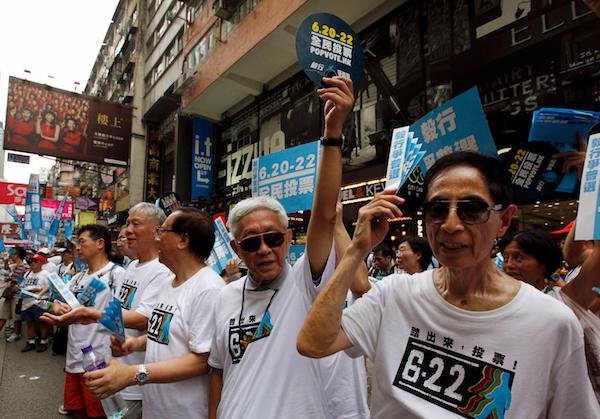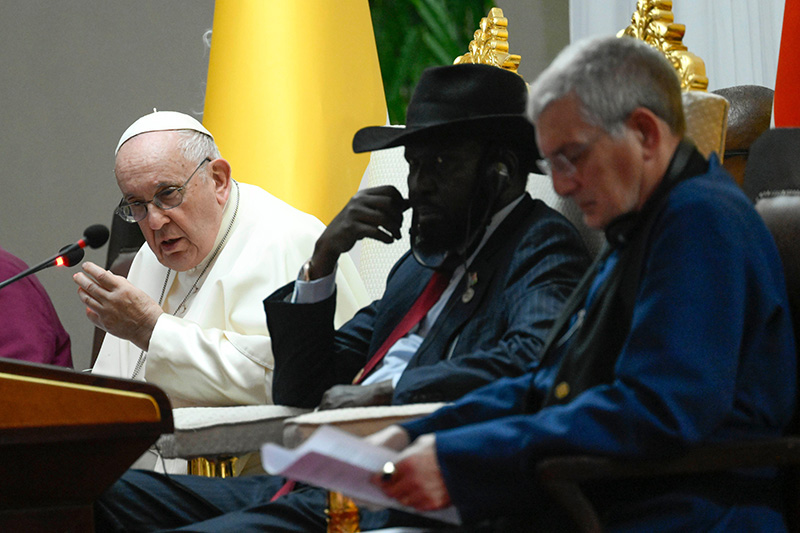The President of South Sudan says he will resume his engagement with a Church-led peace process in response to Pope Francis’ landmark ecumenical pilgrimage to the war-torn country.
President Salva Kiir made the announcement in the garden of the presidential palace on the afternoon of 3 February in front of the Pope, the Archbishop of Canterbury, Justin Welby, and the Church of Scotland’s moderator, Iain Greenshields.
In a hard-hitting speech, Francis told South Sudan’s political leaders that history will “cancel” their memory if they don’t end the bloodshed, while Archbishop Welby said peace and reconciliation is now “in their hands”.
The Rome peace talks, convened by the Catholic peace and justice group Sant'Egidio, are important because it is a political dialogue between the South Sudanese government and the multiple armed “holdout” groups that refused to sign South Sudan’s 2018 peace agreement.
The government had suspended the Rome talks a few months back, with both sides accusing the other of acting in bad faith. But President Kiir told the gathering on 3 February that in “honour” of Francis’ South Sudan visit, he would lift the suspension and come back to the table.
Francis's ecumenical pilgrimage to South Sudan is unprecedented. When the Pope’s plane touched down in Juba, the archbishop, the moderator, and the Holy See’s apostolic nuncio to South Sudan boarded the aircraft to welcome Francis to the country.
This is the first time a Pope has undertaken a joint visit with an Archbishop of Canterbury and it is the first papal visit to South Sudan, which became independent in 2011.
Francis, Archbishop Welby and Dr Greenshields each addressed political and civic leaders in the garden of the presidential palace. The church leaders sat together with the president under a canopy and addressed several hundred people, including a number of foreign diplomats and aid workers.
Before the speeches, the Pope met with the president for a 30-minute private meeting and then joined the other church leaders and officials to talk to the country’s vice presidents for another 30 minutes.
“In peace as in life, we all journey together, so I have come with two brothers”, the 86-year-old Pope, who arrived in the garden in a wheelchair, said. “Together, stretching out our hands, we present ourselves to you and to this people in the name of Jesus Christ, the Prince of Peace.” South Sudan, he added, “has a special place in my heart”.
The ecumenical pilgrimage follows a 2019 retreat in the Vatican led by Archbishop Welby with long-running foes President Salva Kiir and Vice-President Riek Machar. It ended with Francis kneeling to kiss their feet in a dramatic call for peace.
But political observers feel that the country’s leaders have not followed up on the promises from the retreat, and in his remarks, Archbishop Welby told them: “We expected more; you promised more.” Archbishop Welby said peace is needed “for the heroic and brave and courageous people of South Sudan, who fought for so long for their freedom and won it”.
Francis, meanwhile, called on the leaders to make an unequivocal commitment to end the violence in the country. “No more bloodshed, no more conflicts, no more violence and mutual recriminations about who is responsible for it, no more leaving your people athirst for peace. No more destruction: it is time to build. Leave the time of war behind and let a time of peace dawn,” the Pope said.
Despite signing various agreements, the country’s leaders have been accused of failing to bring peace while its people endure unimaginable suffering. President Kiir has reneged on commitments in the past. Francis urged for a different political approach, and seated in the front row of the audience was vice-president Machar.
“They [the people] need fathers, not overlords,” he said. “They need steady steps towards development, not constant collapse.”
Archbishop Welby said the pilgrimage was an attempt to put Christian unity into action and that they had come to South Sudan “on our knees to wash feet, to listen, serve and pray with you”.
Echoing the message of unity, Dr Greenshields said he believed “it is in the reach of the president, vice-presidents, leaders and people of South Sudan to extend the reach of justice and compassion to the whole of this young and optimistic country.”
South Sudan’s conflict has claimed the lives of around 400,000 and seen more than two million forced to leave their homes.
The country became independent after a long-running civil war with Sudan, ending through a peace agreement in 2005. That peace deal included an independence referendum for the south, which was formed as a country in 2011.
Two years later, however, a civil war broke out, which has continued on and off with a peace and power-sharing deal agreed upon in 2018. But the implementation of the 2018 agreement is behind schedule, and the “transitional period” post-civil war has been extended by two years with elections not expected until late 2024.
“With the next round of talks we will understand better if the Government is genuine. But if President Salva says something like this in front of Pope Francis and the others I believe that he will continue this political dialogue,” Paolo Impagliazzo, the Secretary-General of the Community of Sant’Egidio and a key figure in the Rome process, said after Kiir’s announcement.
“It’s very significant. This dialogue initiative is well known all over the country, and there are lots of hopes and expectations.”
The conflict in South Sudan is rooted in complex ethnic, regional and tribal differences – President Kiir, a Catholic, is Dinka, and vice-president Machar, a Presbyterian, is Nuer – along with a battle for the country's resources and problems with corruption.
The White Nile runs through South Sudan, and in his speech, Francis likened the country to a river saying its course must not be overwhelmed by “the flood of violence, mired in the swamps of corruption and blocked by the inundation of poverty.”
South Sudan, he says, is a land that needs life-giving springs of water.
“The process of peace and reconciliation requires a new start,” the Pope told the country’s leaders.
“Let each citizen understand that the time has come to stop being carried along by the tainted waters of hatred, tribalism, regionalism and ethnic differences. It is time to sail together towards the future!”
He urged them to dialogue and said he hoped his “rare” ecumenical pilgrimage would point them in a different direction towards peace.
Sara Beysolow Nyanti, the United Nations’ humanitarian coordinator in South Sudan and a Baptist pastor who attended the event in the presidential palace, told The Tablet that the Pope’s pilgrimage was a “lifeline” given the recent rise in violence in the country and that resources have decreased due to the war in Ukraine.
“It means the average South Sudanese feels that they haven’t been forgotten,” she said. "It’s not just about being remembered by the outside world, it’s about being remembered by God – that’s how they see it.”
The ecumenical pilgrimage has been in the works since 2017 but was repeatedly delayed due to security fears, Covid-19 and Francis’ health.
The pilgrimage is the most high-profile visit to South Sudan by leaders from outside the country. It marks a bold attempt by the Christian churches to deploy their soft-power moral influence for a country that has suffered from decades of civil war.
The Catholic, Anglican and Presbyterian churches in South Sudan, which work closely together through a joint council, play a vital role in the country's civic life, where a majority are Christians.
Speaking to The Tablet, the Archbishop of Juba, Stephen Ameyu, said that when it came to ecumenical collaboration, the churches in South Sudan “are more advanced than anybody: we work together for peace, reconciliation and in response to emergencies.”
Tomorrow the Pope will meet bishops and clergy in the morning and then meet with internally displaced people: south Sudan’s conflict has meant more than two million people have been forced to leave their homes.
Christopher Lamb, The Tablet’s Rome Correspondent, is among the journalists travelling with Pope Francis and is filing regular reports on the papal visit to Africa.



 Loading ...
Loading ...